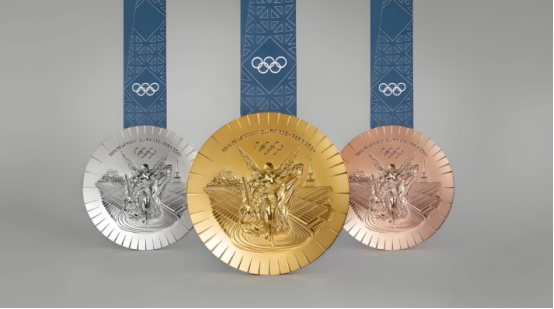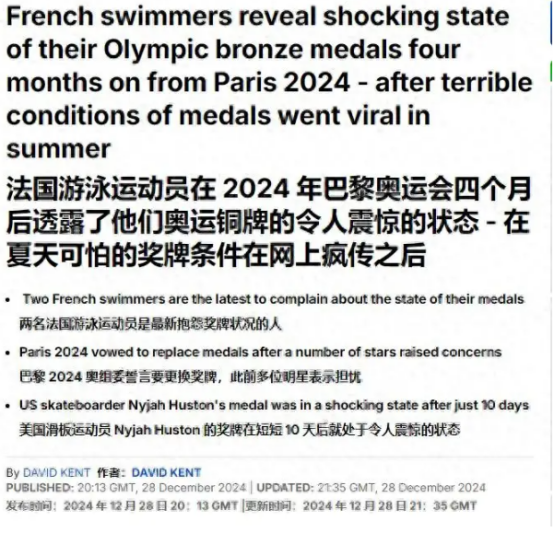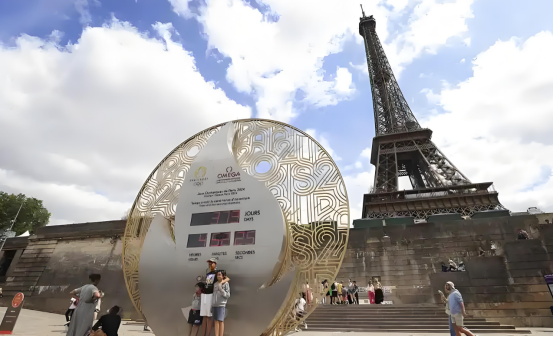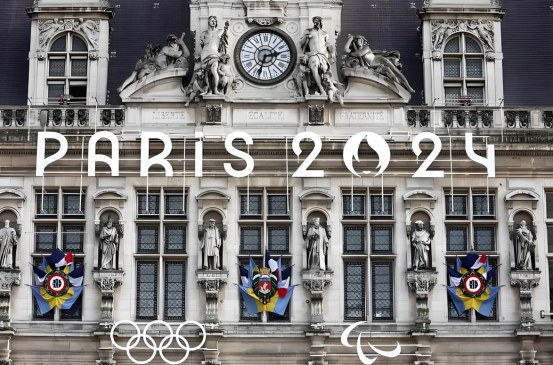Two days ago, a news story about the Paris Olympic medals topped the trending list, quickly sparking heated discussions among netizens.
Olympic medals are supposed to be symbols of infinite honor, yet over 100 have been returned to Paris in disgrace.

Some jokingly said that the bronze medal they received resembled a piece of "crocodile skin."
Others were more supportive, claiming it wasn't a medal but a hundred-year-old Parisian antique.

This caused netizens to exclaim that Paris has truly embarrassed itself this time, with the shame spreading globally.
So why are so many medals being returned?

If there's anything that can validate an athlete's efforts and achievements, Olympic medals are undoubtedly the most powerful proof.
When once-celebrated athletes find themselves in trouble, medals can also serve as a quick way to make money.

Athletes who have fought hard for their honors on the field return home only to find their medals rusted.
This makes most athletes feel very uncomfortable, leading some to return their rusted medals.

This isn't the first time this has happened; soon after the Olympics ended, people started returning their medals.
By the 13th, British newspapers reported that over 100 gold medals had been returned.

The next day, the international Olympic Committee addressed the issue, stating that all problematic medals would be replaced.
Last August, French athletes noticed this phenomenon shortly after receiving their medals, saying they looked "smashed and oxidized."

Some medals even began discoloring before the Olympics concluded.
Harper mentioned that her bronze medal had lost its luster and was starting to fade.

When the truth came out, everyone realized how "stingy" the Paris Olympics were.
It turns out that there are strict requirements for the weight and size of Olympic medals.

Take gold medals, for example; they aren't entirely made of gold but mainly consist of a large piece of silver plated with gold.
According to IOC regulations, gold medals must contain at least 550 grams of fine silver and six grams of gold to meet the minimum standard.

Paris' medals are amusing; their gold medals weigh 529 grams, containing 505 grams of silver, six grams of gold, and 18 grams of iron.
Some may wonder why medals contain iron?

This is the design concept of the Paris Olympic medals, with the iron pieces coming from fragments of the Eiffel Tower.
While the design concept is good, at least the weight should be sufficient; the total weight doesn't even reach the required silver content, which is essentially manufacturing according to the lower limit.

Silver medals are made of silver, which is undeniable and requires no debate.
Let's look at bronze medals; since copper is soft, additional materials like zinc and tin are added to make them harder.

As we all know, copper oxidizes when exposed to water and air, with the extent largely determined by the ratio of various alloys added.
Ironically, cheaper metals accelerate the oxidation of bronze medals, explaining why some start rusting quickly.

Studies show that the material value of their gold medals is just over 1,000,whilesilvermedalsareworthnomorethan500.
Most laughably, bronze medals have a material value of only $4.6, not even close to the other two medals, which is pitifully low.

To put it into perspective, you'd need $5.6 to buy a Big Mac burger.
Bronze medals are less valuable than a burger, which is why some athletes are furious, risking their lives for such a thing?

Contrastingly, the series of issues with Paris Olympic medals led netizens to reminisce about the gold-inlaid jade medals from the Beijing Olympics.
Not only the medal material but also the ribbon production surpassed other countries.

Our medals' ribbons are made of mulberry silk and polyester fibers, treated with nanotechnology to be waterproof, fireproof, and never fade.
Regarding fireproofing, a Russian athlete's house caught a significant fire in 2021, leaving everything in ruins.

They assumed the medal would be destroyed, but the one from Beijing remained intact, even impressing her with its quality.
Paris' stinginess extends beyond medals to the accommodations provided to athletes, astonishingly frugal.

Initially filled with joy and confidence, athletes from various countries traveled to France, aiming to bring glory back to their nations.
However, upon arriving at the Olympic village, they were stunned.

Their original intention was to promote "environmental protection" and build an eco-friendly Olympics.
In the sweltering heat, with temperatures hovering around 40 degrees, the residences had no air conditioning installed.

This made our athletes secretly worry if their bodies could withstand the conditions.
This "no air conditioning, energy-saving" measure sparked significant controversy.

Eventually, the organizing committee had no choice but to compromise, allowing national delegations to purchase or rent air conditioners at their own expense.
After this measure was announced, our team immediately bought truckloads of air conditioners for the athletes' rooms.

Although this issue was resolved, the food supply faced criticism from various countries.
To further reduce carbon emissions, they couldn't provide French fries, citing the non-use of deep fryers.

They promoted vegetarian meals, with over half being plant-based, and some temporary venues didn't offer meat at all.
With athletes expending massive amounts of energy daily, you're suggesting they eat vegetarian? As Song Xiaobao would say, "Are you kidding?"

Looking back at the 2022 Beijing Winter Olympics we hosted, the "zero-gravity beds" alone earned rave reviews from athletes worldwide.
The dining hall was lined with various food stations, each staffed and color-coded to indicate the food types, offering a wide variety.

Cuisines from different countries were displayed before them.
American snowboarder Mastro even showcased our breakfast offerings on social media, praising the variety and saying, "The food at the Winter Olympics village is really great; they really have everything."

Regardless of the concept, hosting competitions should ensure athletes return satisfied.
The problems with Paris Olympic medals stem from insufficient effort.

Facing the world's nations, such shoddy workmanship reflects poorly on Paris!
Sources:

The Paper - July 30, 2024, "Are Paris Olympic Medals Made from Scrap? Interesting Knowledge Increases"
Global Times - February 5, 2022, "Foreign Athletes Give 'Flower-like' Praise to the Winter Olympics Village"

Red Star News - June 26, 2024, "What Do Paris Olympics Athletes Eat? No Fries in Restaurants, Focus on Environmental Protection, Half Vegetarian"
Guangming Net - July 8, 2024, "Paris Olympics Could Face 40°C Heat! Over 2,500 Air Conditioners Purchased by Teams? China Also Takes Action!"
Beijing Science and Technology Association - August 26, 2024, "How Are Olympic and Paralympic Medals Made?"
Luzhong Morning Post - January 14, 2025, "Made According to Minimum Standards! Paris Olympics Gold Medals Contain Only 6 Grams of Gold, Over 100 Medals Returned"
Guangming Net - January 15, 2025, "Problematic Paris Olympics Medals to Be Replaced; Over 100 Medals Returned Due to Rust and Other Issues"
Douyin Encyclopedia - "Medals of the 2008 Beijing Olympics"